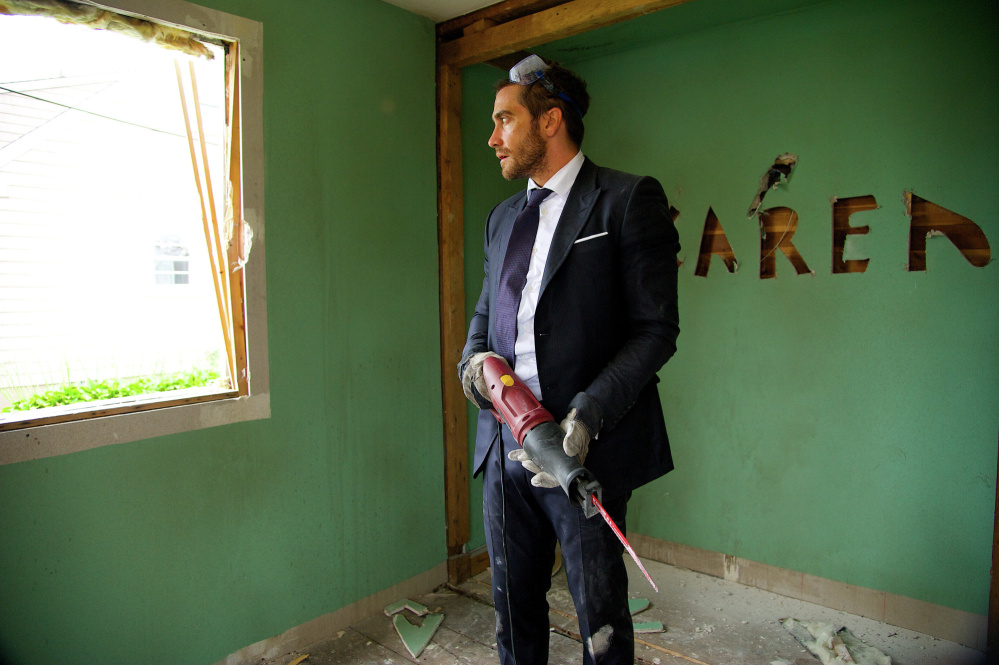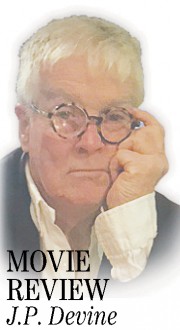“The future isn’t what it used to be.” – Poet Paul Valery
Davis Mitchell (Jake Gyllenhaal), a $4,000 suited investment banker in his father-in-law’s (Chris Cooper) firm, is living the dream life as one of the princes of the city.
But from scene one we see that Davis’ life has been, for some time, one long winter of discontent. He and his wife, Julia (Heather Lind), snip through a litany of annoyances on the daily ride from their crystal palace to the towers, when another car smashes into them.
Julia is DOA, and Davis is left with only scratches on his face, but deeper wounds yet unseen.
Thus a struggle begins to pull his life back together. But he’s not sure he wants it, at least not that one.
While sitting in the green vacuum land of a hospital waiting room for the final word on Julia’s condition, Davis begins his fall into the rabbit hole of his troubled mind. Maybe the accident thawed some long frozen emotional soup that has begun to bubble up? Do you think?
It starts with a dollar pack of M&Ms that won’t drop down in the vending machine. So even on the day of the funeral, Davis begins a series of handwritten letters to the vending machine company. This will bring in the mysterious voice of complaint clerk Karen Moreno (Naomi Watts) that starts a deeper slide into darkness, but with a promise of redemption.
Father-in-law Phil, in an attempt to heal, unknowingly kick-starts a chain of events when he suggests that Davis should start rebooting his life by unpacking the software “piece by piece.” Be careful what you wish for.
Right away fellow workers begin to find a trail of weird droppings: a defective door in the men’s room taken down ‘piece by piece” and laid out on the marbled floor, a frozen computer in Davis’ office taken apart “piece by piece” right down to each screw and knob, as though a Luddite ghost had invaded their world.
Director Jean-Marc Vallee (“Dallas Buyer’s Club”) and his team, screenwriter Bryan Sipe and cinematographer Yves Belanger, take us to the street with Gyllenhaal skipping ahead, earplugs in place, singing and dancing through crowds of urban sloggers who ignore him.
Comedy ensues: After being banned from his office, he begins a “Mr. Toad’s Wild Ride” around town. He stops at a construction site where an office is being torn down and offers to help. He even offers the boss $200 for the pleasure. Before long he’s one of the crew, swinging sledge hammers against walls with an almost sensual pleasure, eventually renting a bulldozer to completely destroy his own expensive state-of-the-art home.
His relationship with Karen deepens. She abandons her abusive live-in boyfriend and with her weed-smoking, inchoate gay teen son (an amazing Judah Lewis) joins forces with Davis.
“Demolition” is being hailed by critics as a mixed bag of delights and a few disappointments. Most are calling it “complex, interesting, energetic, honest, genuine, but stressing “Very well acted.” How can it not be? The great Chris Cooper has a bunch of powerful, heart-rending scenes as the bereaved father, a powerful financial force shattered by the loss of his beloved daughter. Naomi Watts continues to enhance her reputation as one of our great actresses. Judah Lewis, the troubled teen, is simply wonderful.
And there is Gyllenhaal, growing each day into a mature movie star, playing a man doing what all of us, sooner or later, long to do: break something.
J.P. Devine is a former stage and screen actor.
Send questions/comments to the editors.



